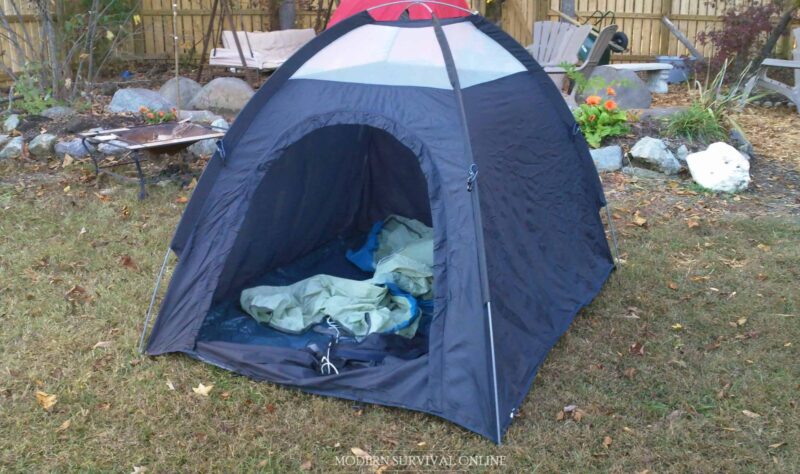Camping can be a great way to get away from the hustle and bustle of city life and enjoy nature. However, if you’re not careful, camping can also be dangerous.

One of the biggest concerns while camping in a tent, especially in open spaces, is being struck by lightning. Are tents safe to camp in during a lightning storm?
No, tents are not safe to stay in during a lightning storm. A tent offers no more protection than being in the open, and it may make you more vulnerable to lightning either directly or in the case of a nearby strike.
You’ll need to find better shelter than a tent if you want protection from lightning. There is much more to learn if you want to refine your understanding of all the factors involved. Keep reading to find out!
Tents Offer No Protection from Storms in General
While it is true that a tent might offer some shelter from gentle rain or mild wind, it does not provide any protection from serious thunderstorms or lightning.
In fact, being in a tent during a storm could be more dangerous than being outside. You’ll have more than lightning to contend with, too, though this is the threat most people associate with them. More on that in just a minute.
During any thunderstorm, you should avoid touching anything conductive that could channel electricity from a lightning strike into you.
This could be anything that is attached to the tent, such as poles or guy lines. It need not be metal to conduct this level of electricity and if lightning strikes nearby, the current could travel through the material of the tent and into your body.
You should also avoid using any electronics inside your tent during a storm. This includes cell phones, laptops, and even battery-powered lanterns.
All of these items can potentially attract lightning and create a spark that could ignite the flammable materials in your tent in case of a near lightning strike.
Tents Won’t Save You From Lightning
While tents might not offer any protection from thunderstorms, what about lightning specifically? Surely being inside a tent is better than being out in the open, right? Unfortunately, that’s not the case.
In fact, being in or near a tent during a lightning storm can actually be more dangerous than being out in the open. This is because tents are often made of flammable materials like nylon or polyester.
If lightning strikes nearby, the current could travel through the ground, right through the tent and into you, roasting you and burning out your nervous system.
Additionally, many tents have metal components which will only serve to attract and channel lightning, making your situation statistically worse!
Or Pounding Rain
Trying to rest in a tent that is being pounded by hard rain is usually the opposite of a relaxing experience, and one that can be made all the worse if your tent is leaky.
But you have more to worry about than discomfort when facing down torrential rain from a passing storm.
You need to be aware of the dangers posed by severe weather conditions, which can include flash flooding, particularly when your tent is in a flood-prone area, canyon, gully or any place where massive quantities of water can accumulate or sweep through without warning.
Your tent might be carried away with you inside, a serious drowning risk, or else it could collapse and wrap around you, leaving you helpless and soaked!
A Tent Definitely Won’t Help With High Winds, Either
If you’re camping in an area that is experiencing high winds, be aware of the dangers.
A tent will do nothing to protect you from being blown away should the wind blow hard enough, such as the case of a wind shear or tornado, and can even cause you to be trapped if it collapses on you.
Make sure to keep an eye on weather forecasts and avoid camping when conditions are right for severe windy weather if possible.
If you must camp in a windy time, find a sheltered spot where your tent will benefit from a windbreak and less likely to blow away.
Also it’s important to be aware of the dangers posed by flying, windborne debris.
A gust of wind can easily knock down a branch, push over a tree or start a domino effect that see large rocks tumbling down a slope.
Any of these could seriously injure or even kill you if they hit you. Avoid camping under tall trees or near loose, vulnerable slopes if possible.
If you must camp in such an area, find a sheltered spot where you be better shielded if the wind does manage to knock things over.
Where Should You Shelter from a Storm?
So, what should you do if you’re caught in a lightning storm while camping in your tent? The best thing to do is to find a nearby building or vehicle that you can take shelter in.
If that’s not possible, then get as low to the ground as you can and make yourself as small a target as possible. Avoid being the tallest object in the area, and avoid touching metal objects since they can conduct electricity.
If you’re in a group, have everyone huddle together so that you present the smallest possible target. And whatever you do, don’t climb higher or hold onto any metal implements!
Tents Are Not Safe in Thunderstorms
As you can see, camping in a tent during a lightning storm can be extremely dangerous. A tent will not protect you at all from lighting or other severe weather.
It’s important to be aware of the risks before setting out, and to take the necessary precautions to protect yourself and your fellow campers.
With a little planning and common sense, you can ensure that your camping trip is safe and enjoyable, no matter what the weather throws at you!
What are some of the other dangers posed by severe weather conditions while camping?
Share your experiences and tips in the comments below! And be sure to check out our other blog posts on camping safety for more information on staying safe while enjoying the great outdoors.

Like what you read?
Then you’re gonna love my free PDF, 20 common survival items, 20 uncommon survival uses for each. That’s 400 total uses for these dirt-cheap little items!
Just enter your primary e-mail below to get your link:
We will not spam you.


